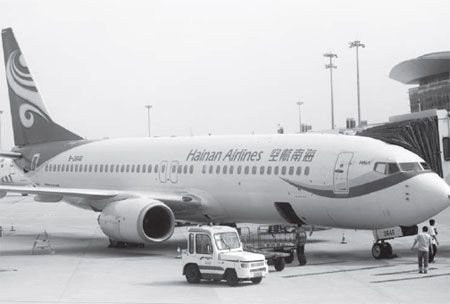More aircraft on the way for Hainan Airlines
By Wang Wen (China Daily) Updated: 2014-06-12 06:54
New Boeings offer carrier competitive advantages in the North American market with more routes
To expand its network in North America, Hainan Airlines Co Ltd will order more Boeing B787 aircraft in the next several years, a senior executive said.
The fourth-largest carrier in China is already using all of its eight B787 aircraft in North America, where it has three routes. It will add Boston as its fourth destination on June 20.
Two B787 planes that have already been ordered will be delivered in the next year, said Wang Yingming, executive chairman and executive president of HNA Aviation Group Co Ltd, parent company of Hainan Airlines.
"A fleet of 10 Boeing 787 aircraft can support five to six destinations in North America, and our long-term plan is eight destinations there," Wang said.
The carrier might also lease aircraft as it expands, he added, and it will continue increasing its investment in North America to meet "huge demand" there, Wang said.
Chinese civil aviation authorities are encouraging the nation's carriers to develop international networks, industry insiders said, given that many foreign airlines are already active in China.
"Approval to run international routes is easier to obtain now and flight rights into the US aren't a problem," Wang said.
Hainan Airlines has seen first-hand the process of Chinese carriers' move into North America during the past six years.
The carrier launched Beijing-Seattle service, its first route to the US, in 2008. Since then, Sino-US air traffic has kept increasing because of easier visa policies and rising bilateral trade, said Liu Jichun, director of international business development of Hainan Airlines.
The Chinese carrier is already making a profit on the Beijing-Seattle route. The Beijing-Toronto route, its second in North America, is also profitable.
"It took longer than we expected for the Beijing-Seattle service to make a profit, since it was our first footprint in the US," Wang said.
It's a strategy of Hainan Airlines to explore smaller cities, he said. "We went to destinations with no other players and developed the markets there," Wang said.
The carrier won with its gamble on the Beijing-Seattle route while avoiding tough competition in major gateway cities such as Los Angeles and San Francisco.
Hainan Airlines is a latecomer to the international market and has to invent new strategies, some analysts said.
Pursuing a "differential competitive strategy" is necessary for Hainan Airlines, as other large carriers have already scooped up many market resources, said Zeng Xu, an aviation analyst at Industrial Securities Co Ltd. Having the B787 is helping the carrier a lot in the US market, Zeng said.
Hainan Airlines is also exploring opportunities in other regions such as Europe and Africa.
International passengers comprise about 10 percent of the carrier's total, Wang said, and he aims to double that.
Chinese airlines have to move fast in the international market, as other airlines, especially those from the Middle East region, also have lofty global ambitions, Wang said.
wangwen@chinadaily.com.cn
|
Airport workers load luggage into a Hainan Airlines aircraft at Changsha Huanghua International Airport. Provided to China Daily |
(China Daily 06/12/2014 page14)
- 'Cooperation is complementary'
- Worldwide manhunt nets 50th fugitive
- China-Japan meet seeks cooperation
- Agency ensuring natural gas supply
- Global manhunt sees China catch its 50th fugitive
- Call for 'Red Boat Spirit' a noble goal, official says
- China 'open to world' of foreign talent
- Free trade studies agreed on as Li meets with Canadian PM Trudeau
- Emojis on austerity rules from top anti-graft authority go viral
- Xi: All aboard internet express








